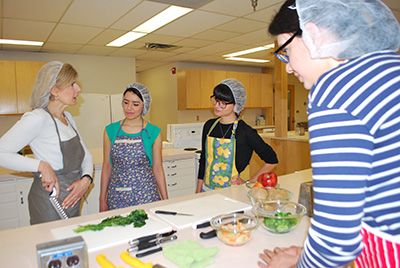
Nutrition professor Anna Farmer, academic lead for the Dietetics Specialization, demonstrates safe carrying and handling of kitchen knives.
Over and over, students call it the best course they've ever taken.
"It ended up being my favourite class of the year," said Heather Chappell, who is in her first year of Dietetics Specialization. "These skills can be applied to real life and to helping people."
So what is it?
"A hands-on course held in a lab that's like a kitchen," says Anna Farmer, who developed the new Applied Foods Theory NUFS 250 course, which teaches everything from how to safely handle raw meat to how to make panna cotta (an elegant Italian dessert of sweetened cream and gelatin).
The course is one of several new requirements for the new Dietetics Specialization program, which comprehensively trains students to be registered dietitians. The course is also open to students in the general stream of the Nutrition and Food Science program.
"It brings to life a piece that was missing," said Farmer, a nutrition professor and academic lead for the Dietetics Specialization. "We were teaching a lot about nutrition and metabolism, but we eat food, not nutrients. So it helps to have an understanding of the social and cultural details of eating."
Following completion of an online self-study component to understand the theory, during each week's lab students get elbow-deep in cooking food on a different weekly theme. They work through stocks, broths and sauces to eggs, meat, fish, breads and vegetables. They practise creating typical meal plans and also plans for limited budgets; they learn how to modify recipes for different diets, including vegetarian, gluten-free, dairy-free or those that adhere to certain religious or cultural practices.
Chappell liked the practise of culturally adapting recipes because the knowledge gained is so fundamental. "It helps us to better understand the types of oils and sweeteners, or types of grains different people would be using."
After they prepare the food, students also evaluate it-what went wrong and what went right-which teaches them how to discuss food in practical terms with clients, and also how to write about it meaningfully, said Farmer.
Many students are living at home or in a student residence and do not have to prepare their own food, so even basic knife skills or the magical properties of yeast are a revelation, she said.
"You need these skills to be a good teacher and an educator," she said.
At 28, Chappell has been cooking her own meals for years, but the course constantly surprised her, whether she was learning what's inside convenience foods, how to build meals from a food bank hamper, or how make tasty meatballs from dried vegetable protein.
"This class forced me to use new ingredients and learn how they work in terms of science."